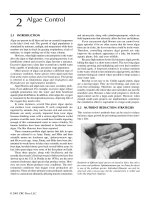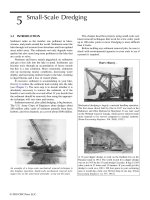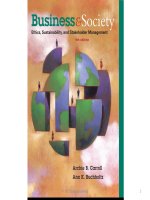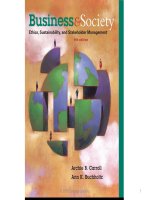Business and society ethics sustainability and stakeholder management 9e chapter 10
Bạn đang xem bản rút gọn của tài liệu. Xem và tải ngay bản đầy đủ của tài liệu tại đây (1.43 MB, 24 trang )
© 2015 Cengage Learning
1
Chapter 10
Ethical Issues in
the Global
Arena
© 2015 Cengage Learning
2
Learning Outcomes
1. Differentiate between the concepts of internationalization and
globalization of business.
2. Explain the ethical challenges of multinational corporations
(MNCs) in the global environment.
3. Summarize the key implications of the following ethical issues:
infant formula controversy, Bhopal tragedy, sweatshops and
human rights abuses, and the Alien Tort Claims Act.
4. Define corruption, differentiate between bribes and grease
payments, and outline the major features of the Foreign Corrupt
Practices Act.
5. Describe the growing anticorruption movement and the key
players in this movement.
6. Identify and discuss strategies for improving global ethics.
© 2015 Cengage Learning
3
Chapter Outline
• Business Challenges in a Multinational Environment
• Ethical Issues in the Global Business Environment
• Improving Global Business Ethics
• Summary
• Key Terms
© 2015 Cengage Learning
4
Ethical Issues in the
Global Business Environment
• The growth of global business as a critical
element in the world economy is one of the
most important developments of the past
half century.
• Characterized by a rapid growth of foreign
direct investment in developing nations like
China, India, and Russia.
• In less-developed countries (LDCs), because
there are no government regulations, the
temptation is to lower or reject standards.
• The expanded marketplace has been called
the transnational economy.
© 2015 Cengage Learning
5
Business Challenges in a
Multinational Environment
• A multinational corporation (MNC) or
multinational enterprise (MNE) seeks to be
accepted into an unfamiliar society.
Two major challenges:
1. Achieving corporate legitimacy in an
unfamiliar society.
2. Differing philosophies between MNCs
and host countries.
© 2015 Cengage Learning
6
The Dilemma of the Multinational
Corporation
Home Country
Stakeholder Pressures
Standards
Practices
Host Country
Stakeholder Pressures
The Multinational
Corporation
Standards
Practices
Ethics
Ethics
Laws
Laws
Culture
Culture
Customs
Customs
System of
Government
System of
Government
Socioeconomic
System
Socioeconomic
System
© 2015 Cengage Learning
7
Ethical Issues
in the Global Business Environment
© 2015 Cengage Learning
8
Questionable Marketing
and Plant Safety Practices
Infant Formula Controversy•Nestle mass-marketed infant formula to poor mothers
in tropical LDCs, knowing the health risks.
•As a result, there was a dramatic increase in infant
malnourishment and sickness.
Bhopal plant crisis –
•Union Carbide’s plant safety practices led to the
“worst industrial accident in history,” killing more than
2,000 people, and injuring 200,000 others.
The lack of regulation in LDCs is a temptation to lower
or reject standards used in the firm’s home country.
© 2015 Cengage Learning
9
Sweatshops,
Human Rights, and Labor Abuses 1 of 2)
•
•
MNCs’ use of women and children to
cheaply staff factories.
Many major corporations and many
countries have been involved.
Sweatshops •
Characterized by child labor, low pay, poor
working conditions, worker exploitation,
and health and safety violations.
•
Increased scrutiny of sweatshop practices in
recent years.
© 2015 Cengage Learning
10
Sweatshops,
Human Rights, and Labor Abuses
(2 of 2)
Social Accountability 8000 (SA8000) –
An effort to improve sweatshop conditions created
by Social Accountability International (SAI):
1.Child Labor
2.Forced Labor
3.Health and Safety
4.Freedom of Association & Collective Bargaining
5.Discrimination
6.Discipline
7.Working Hours
8.Compensation
9.Management Systems
© 2015 Cengage Learning
11
Alien Tort Claims Act
and Human Rights Violations
Alien Tort Claims Act (ATCA) •Efforts to sue transnational companies for
violations of international law in countries outside
the U.S.
•Efforts by foreign individuals to sue U.S. firms in
U.S. courts for the actions of their companies
abroad.
In 2013, the U.S. Supreme Court held that the law
cannot be applied to actions that take place
overseas, but only to actions which take place in
the United States.
© 2015 Cengage Learning
12
Corruption, Bribery,
and Questionable Payments
Corruption - attempts to influence the
outcomes of decisions wherein the nature and
extent of the influence are not made public.
Bribery - the practice of offering something
(usually money) in order to gain an illicit
advantage.
Questionable payments – those not easily
categorized; they may be “grease” payments
(allowed), or bribes (not permitted)
© 2015 Cengage Learning
13
Corruption
Instances of corruption •Bribery of government officials
•Giving of questionable political contributions
•Misuse of company assets for political favors
•Kickbacks and protection money for police
•Free junkets for government officials
•Secret price-fixing agreements
•Insider dealing, and more
© 2015 Cengage Learning
14
Arguments For and Against Bribery
© 2015 Cengage Learning
15
Bribes or Grease Payments?
Grease Payments -
•Relatively small sums of money given to minor officials
for the purpose of getting them to:
•
Do what they are supposed to be doing
•
Do what they are supposed to be doing faster
•
Do what they are supposed to be doing better
Bribes •
•
Relatively large amounts of money given for
the
purpose of influencing officials to make
decisions
or take actions that they otherwise might not.
Money given, often to high-ranking officials, to
get them to purchase goods or services.
© 2015 Cengage Learning
16
Initiatives Against Bribery
© 2015 Cengage Learning
17
Improving Global Business Ethics
• Business ethics is much more complex at
the global level than at the domestic level.
• Complexity arises from the fact that a wide
variety of value systems, stakeholders,
cultures, forms of government and socioeconomic conditions and standards of
ethical behavior exist throughout the world.
• Because the U.S. and European MNCs have
played such a leadership role, these firms
have a heavy responsibility.
© 2015 Cengage Learning
18
Balancing & Reconciling the Ethics
Traditions of Home & Host Countries
The Challenge
of the Multinational Corporation
Home Country
Ethical Standards
OR
© 2015 Cengage Learning
Host Country
Ethical Standards
19
Ethical Choices in
Home vs. Host Country Situations
International Law
Global Codes of Conduct
ETHICAL
IMPERIALISM
Home
Country
• Cultural standards
• Ethical/moral
standards of home
country
BROAD
MIDDLE
GROUND
Mix of Home and Host
Country Standards
CULTURAL
RELATIVISM
Host
Country
• Cultural standards
• Ethical/moral
standards of host
country
Application of
Ethical Principles
© 2015 Cengage Learning
20
Strategies for
Improving Global Business Ethics
Four major strategies that could help MNCs
conduct global business while maintaining
ethics:
1.Create global codes of conduct.
2.Link ethics with global strategy.
3.Suspension of business activities in certain
countries.
4.Create ethical impact statements and audits.
© 2015 Cengage Learning
21
Corporate Action
Against Corruption
Five vital steps for an anticorruption program:
1.High-level commitment by top management
2.Detailed statements of policies and operating
procedures
3.Training and discussion of policies and
procedures
4.Hotlines and help lines for all organizational
members
5.Investigative follow-up, reporting, and
disclosure
© 2015 Cengage Learning
22
Key Terms (1 of 2)
• Alien Tort Claims
Act (ATCA)
• Anticorruption
movement
• Bhopal tragedy
• Bribe Payers’ Index
(BPI)
• Bribery
• Caux Roundtable
Principles
• Corruption
• Corruption
Perception Index
(CPI)
• Cultural relativism
• Ethical impact
statements
• Ethical imperialism
• Fair Labor
Association (FLA)
• Foreign Corrupt
Practices Act (FCPA)
• GBS Codex
• Grease payments
• Hypernorms
• Infant formula
controversy
© 2015 Cengage Learning
23
Key Terms (2 of 2)
• Internationalization
• Less-developed
countries (LDCs)
• Multinational
corporations
(MNCs)
• offshoring
• Outsourcing
• Social
Accountability
International (SAI)
• Sweatshops
• Transparency
International (TE)
• UN Convention
Against Corruption
(UNCAC)
• UN Global Compact
© 2015 Cengage Learning
24









